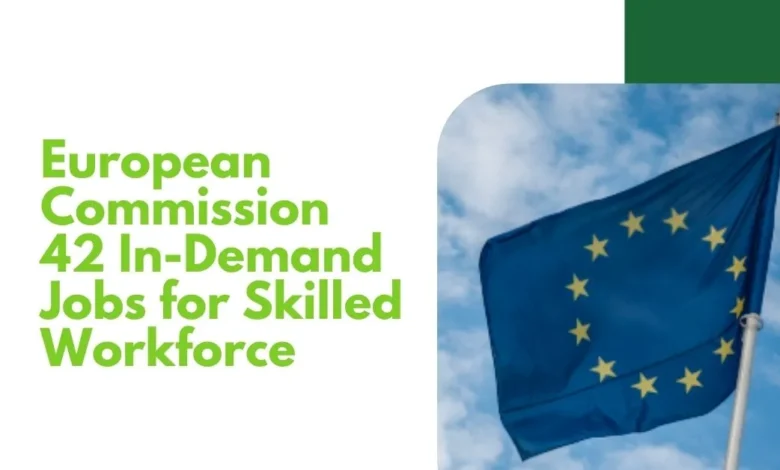European Commission 42 In-Demand Jobs for Skilled Workforce

If you’re a competent worker from anywhere in the world, now is the time to take advantage of the fast-changing nature of employment in Europe. In industries where local talent is just insufficient, the European Union is welcoming experts from around the world who possess talent, experience, and the motivation to succeed. There is a great chance for electricians, AI experts, carers, mechanics, and many more to fill the gaps and find fulfilling, well-paying jobs in Europe, according to a recently published list of 42 shortage occupations.
Long-term security, professional growth, and supporting Europe’s expanding economy as it shifts toward sustainability, digital innovation, and demographic balance are more important than employment openings.
Massive Demand in Transportation
Due to a startling shortfall of more than 400,000 truck drivers, Europe’s roadways are quieter than they should be, not because fewer goods are being moved. Since 2022, this shortage has been growing, and nations are attempting to recruit fresh talent by offering competitive pay, licensing incentives, and sophisticated training initiatives.
You’re already being considered if you have commercial driving experience or a logistics background. Due to the increasing demand, many drivers are now making significantly more money than the national average, from the Netherlands to Italy. This industry may be the quickest path to employment in Europe for foreign workers, particularly those who speak the language or have a spotless driving record.
A Healthcare Sector Crying Out for Help
Europe is rapidly aging. Because of this, there is a greater need for healthcare workers than local training programs can meet. This indicates that the continent is in dire need of physicians, nurses, care assistants, and other allied health workers.
Foreign-trained medical professionals who are willing to relocate, particularly to underserved rural areas, are sought after by nations like Germany, Sweden, and the Baltic states. Your abilities are in demand, whether you have the level of experience of a general practitioner or are a recent nursing graduate. Relocation packages, language instruction, and expedited acceptance of international credentials are becoming more and more prevalent.
Green & Digital Jobs of the Future
In addition to addressing climate change, Europe’s Green Deal is a major driver of employment development. The need for environmental engineers, construction managers, and technicians who can contribute to the creation of a cleaner, greener continent is enormous due to significant expenditures in renewable energy, sustainable infrastructure, and energy-efficient housing.
The digital revolution is speeding up at the same time, but there is a severe lack of skilled computer workers. Europe is more interested in you than ever if you work in data science, software engineering, AI development, or cybersecurity. With clear pathways to long-term employment and permanent residency, many EU nations are aggressively seeking foreign IT specialists.
Salaries Are Rising, Support Is Growing
In addition to being welcomed, the scarcity of workers is being addressed with increased pay, free training, and opportunities for career advancement. For instance, businesses in the transportation and healthcare industries are providing everything from paid relocation to sign-on bonuses.
High Demand + Real Support = Your Advantage
- Global Need: To address the expanding shortages in trades, engineering, IT, and healthcare, Europe is aggressively looking for qualified foreign workers.
- Concrete Support: By using websites such as EURES (European Employment Services), you can get:
- Tailored job-matching services
- Language training
- Relocation and integration support
Why It’s a Game-Changer
- Not Just a Job: You’re entering a secure, long-term position with a mission: supporting economies going through technological and demographic revolutions.
- Career Growth: Use EU-based standards, multicultural exposure, and ongoing education to accelerate your progress.
- A Strategic Move: It puts you in a long-term position both personally and professionally, offering opportunities for international credentials, residency, and citizenship.
How to Make Your Move
Here is a detailed guide to get you started if you’re serious about starting your career in Europe:
1. Identify a Shortage Occupation
Begin by matching your experience to one of the 42 identified shortage occupations in the EU. These typically include roles in:
- Healthcare (e.g., nurses, carers)
- IT & Engineering
- Construction & Skilled Trades
- Education & Hospitality
[Reference your home country’s agreements or EU’s official list for more specifics.]
2. Prepare a Professional Europass CV
The Europass CV is the standard format used in Europe:
- Clearly outlines your skills, education, and work experience
- Easy to submit across EURES and employer platforms
Create yours here: https://europa.eu/europass
3. Gather Credentials
- Gather certificates of education, employment references, language proficiency, and any licenses (particularly for regulated or healthcare positions).
- Get them translated into English or the language of the target if necessary.
4. Explore EU Job Portals
Search for open roles on:
- EURES Portal – with thousands of jobs flagged for non-EU applicants
- The national employment agencies in the country where you are going
- Websites for employers and international recruiters
Many listings include filters like “relocation assistance” and “visa sponsorship available”.
5. Connect with EURES Advisors
EURES advisors offer free, one-on-one guidance for international applicants:
- Help with visa and work permit advice
- Country-specific job strategies
- Language training options
- Relocation logistics (e.g., accommodation, insurance, legal documents)
References
Conclusion
For competent foreign workers, the changing European labor market offers an exciting chance to create a safe and lucrative future. There is a need for your skills whether you are an AI developer, truck driver, electrician, caregiver, or green energy specialist. Now is the perfect moment to migrate because of the long-term career path, rising pay, and assistance with relocation and visas. You may take the next dangerous step in your international career journey—not only to find work but to establish a life—by utilizing tools like EURES, creating a compelling Europass CV, and matching your abilities with Europe’s shortage occupation list.
Frequently Asked Questions
Do I need to be from the EU to apply for these jobs?
No. Non-EU foreign workers can apply for many of these positions, particularly through employment boards like EURES that facilitate international hiring.
What is EURES and how can it help me?
A portal called EURES (European Employment Services) links firms across Europe with job seekers. It offers relocation assistance, language instruction, visa counseling, and job matching.




